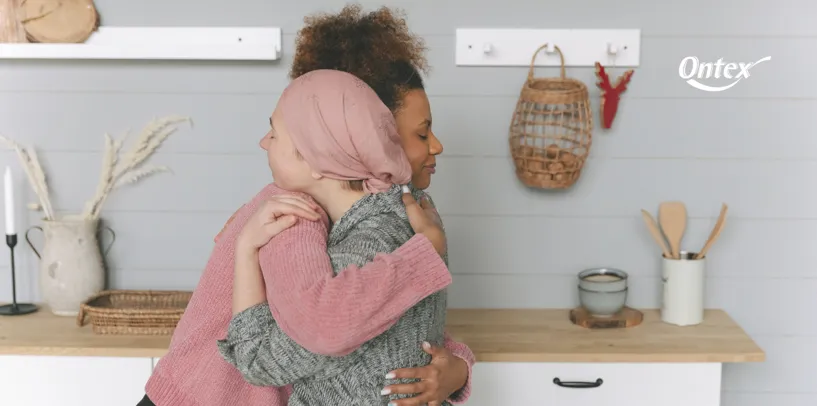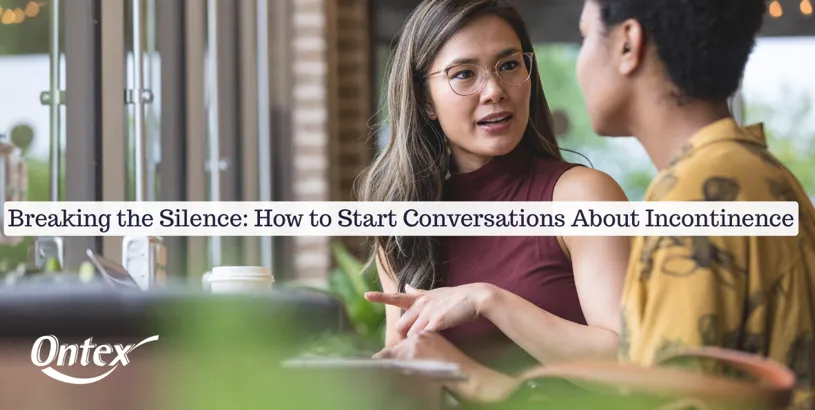Bladder control issues affect one in three Australians, yet most people never talk about them openly. This shame around incontinence is nothing new, but it can often feel worse than the symptoms and keeps people from seeking help.
As specialists in continence care, we at Ontex Healthcare are too familiar with this. We’ve met folks who waited years to reach out, only because they were worried about what others might think. Does this sound like something you or a loved one might be struggling with alone?
Then don’t worry, you’re in good hands! Helping people with incontinence has been our focus for 40+ years, and we want to make talking about it less awkward.
In this article, we’ll break down why this topic feels so taboo and explore how we can start changing these conversations.
Let’s start by looking at why talking about incontinence can feel so hard.
Why It’s So Hard to Talk About Incontinence
The truth is, we avoid talking about incontinence for deeply personal and social reasons that go far beyond simple embarrassment. Here are a few reasons you or a loved one might relate to.

Fear of judgement or pity
The biggest barrier most people face is worrying about what others might think. Many folks fear being seen as weak, dependent, or different from everyone else. This makes complete sense when you consider how private toilet habits have always been in our society.
Association with ageing, weakness, or loss of dignity
Now there’s this one harmful myth that bladder problems are just a normal part of getting older. This is a false belief that only stops people from seeking help, because they think nothing can be done. But the truth is, incontinence affects people of all ages (usually over 15, not 60!) and often has treatable causes.
Misunderstandings about causes and treatments
We also notice that a lot of people don’t really know what causes incontinence or that effective treatments are available. And without the right information, it’s easy to believe the worst or assume that keeping quiet is your only choice.
Lack of media representation and positive language
Name one show (not a medical drama) where a character deals with incontinence. Tough, isn’t it? But even on medical shows, you rarely hear about incontinence (unless it’s an elderly character), which only lets these myths spread.
So how can we change this? Let’s look at some ways you can talk about incontinence more openly and effectively.
Strategies for Effective Incontinence Discussion
Having an open conversation about incontinence can make getting help and treatment a lot easier. Here are our tips to make it less awkward.
Right Approach
Begin every conversation with a calm, caring tone that shows you’re there to help. We like to use simple words like “leaks” or “bathroom troubles” instead of complicated medical jargon. The way you speak sets the whole mood after all, so staying warm and understanding helps the other person feel safer about sharing what’s going on.
Timing Matters
The setting and timing of these conversations matter just as much as the words you use. A quiet moment in a private space, without interruptions, can create the right environment for an honest discussion. But don’t jump straight into worst-case scenarios or speak with pity in your voice. Instead, focus on the fact that help is available and things can get better.
Family Conversations
Conversations with family members often need extra patience because emotions run deeper. Many people already know something’s wrong but feel too embarrassed to admit it openly. So, if someone seems defensive at first, that’s completely normal. They just need time to process and realise that you genuinely care about helping them feel better.
Talking to Carers
With professional carers, be specific about what you’ve noticed and when it happens. They want you to be as specific as possible, so try to share real examples. Most carers really value honest communication because it helps them do their job better.
Healthcare Discussions
Now, before seeing a healthcare professional, writing down your symptoms and how they affect everyday life could help the conversation go more smoothly. Don’t hold back details. Healthcare professionals need the full picture to help effectively. And remember, they’ve heard it all before, so they won’t judge you.
Once that trust is established, the next step is helping them understand their options for professional care and practical solutions.
Encouraging Help-Seeking and Product Use
Many people think they just have to put up with incontinence forever, but that’s simply not true. There are so many options available today, from talking to healthcare professionals to using modern products and trying proven treatments.

Let’s look at what’s possible when you take that first step forward.
Getting Help
Reaching out to a doctor or nurse about bladder problems takes real courage, and it’s one of the best things you can do for yourself. These healthcare professionals deal with incontinence every single day and have plenty of experience helping people.
You can choose from different treatment options, such as specialised therapies or simple lifestyle changes, that can help you feel more in control.
Modern Products
Today’s continence products are nothing like the bulky, uncomfortable options from years past. Modern products feel natural, stay completely discreet, and can genuinely transform your daily comfort levels. Companies like us (Ontex Healthcare) have spent years developing products that focus just as much on dignity and confidence as on function.
Treatment Options
Making small changes, like adjusting what you eat and drink and improving bathroom habits, can be surprisingly effective. Pelvic floor therapy and simple exercises also work well for many people. A physical therapist can guide you step by step, showing you which muscles to strengthen and how to use them correctly.
Daily Confidence
Living with incontinence can feel overwhelming, but it doesn’t have to take over your life. The right mix of support, treatment, and products can help you stay confident and comfortable. For many people, managing symptoms becomes just another simple step in taking care of their health.
Turning Taboos into Conversations
Every person deserves honest, respectful conversations about their health, especially the topics that feel hardest to discuss. And when you speak up about incontinence, you’re making it easier for others to find their voice as well.
Each conversation creates a ripple effect that breaks down the silence keeping so many people trapped. Together, we can make these health discussions feel completely normal rather than shameful.
At Ontex Healthcare, we’re right here to support these important conversations with caring products made for everyday life. Visit us to learn how we can help you live with confidence and dignity.



